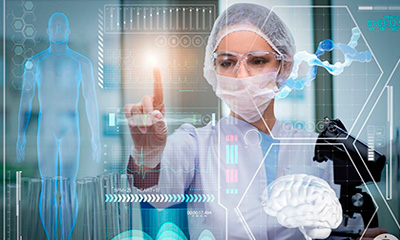Strong hybrid intelligence technologies for medicine
Strategic goal, into which the project contributes, is the development of fundamental principles of Strong Hybrid Intelligence (SHI) to be used in the stack of the artificial intellect practices for economy and industries, and their adaptation for the needs of applied medicine.
Objectives of the strategic project
- Fundamental research. Development of a mathematically grounded concept of strong hybrid intelligence; approaches to ensure interoperability (compatibility) of human and machine intelligence in solving complex problems; principles of modeling and description of cognitive functions.
- Applied solutions. Development of a technological platform for the SHI-based problem solutions; development of frameworks for rapid prototyping, development and introduction of SHI-based products.
- Testing and practical use. Development and pilot application of a software-hardware toolkit for problem solutions in the practical medicine.
- Education. Establishment of a multi-level system of professional education for the R&D and SHI-based solutions and practices.
- Organizational effort in the regional context. Activities aimed to identify new SHI concept structuring, SHI-based product prototyping and testing at all stages of the product lifecycle using the Living Lab model; legal frameworks for the development, testing and industrial applications; full cycle of knowledge acquisition technologies, innovative breakthrough technologies, SHI-based products and services; contribution into the socio-economic development of regions through the technology application in the practical medicine.
Expected results of the strategic project
The project will produce fundamental knowledge and practical results in the field of nanoheterostructure electronics, photonics and radio photonics. Basic technologies for the manufacture of microwave electronics and photonics elements, including photonic integrated circuits (PIC), will be developed. PIC-based prototypes with different functionalities will be developed and offered for the production cycle of the industrial partner companies. They will include monochromatic signal generators, frequency grid generators, noise and random number generators, spectrum analyzers and transceiver modules.
-
Results of fundamental studies
- Mathematically grounded SHI concept.
- Concept of interoperability (compatibility) of interacting intelligent agents based on human and machine intelligence at different levels (neural interfaces, cognitive and semantic communication).
- Concept of dynamic generation of knowledge ontologies in a hybrid environment.
- Concept of co-evolution of the hybrid intelligence system.
- Description of the principles for the SHI safety and ethics.
-
Results of the practical innovative research
- Hardware-software platform for building intelligent SHI-based systems (HI operational core).
- Software framework for rapid prototyping, fabrication and introduction of SHI-based products.
-
Results for the applied medicine
-
3.1 A complex of software and hardware systems, including:
- Software-hardware system for supporting research and development of human cognitive functions for building hybrid intelligence, its evolution assessment and its development trajectory update.
- SHI-based system for supporting research, education, training and situational behavior analysis for the certification of medical personnel using a digital twin of the human body.
- SHI-based support to assist a doctor in the outpatient and inpatient medical services by providing treatment scenarios, risk assessment and disease prevention solutions based on the patient's condition monitoring.
- System of neurorehabilitation based on neuroplasticity control, virtual reality, systemic model of mobility control.
- System of predictive analytics of the heath conditions of individuals and cohorts of the population in certain situations modified by environmental and social factors.
- System for the human health remote monitoring based on the model of human body digital twin and the concept of federal learning.
- System for improving the efficiency of the training process.
- A technological stack for working with a digital medical history of a person stored in a private cloud.
- A biointerface harmonized with a person, including options for compensating for lost body functions and its non-pharmacological correction.
- Nanocarriers of drugs for their targeted delivery to organs with a histohematological barrier.
- Mobile biomedical expert diagnostic systems based on the multimedia data analysis.
- Express diagnostic systems based on multimodal biochips.
-
Results in education and training
- The SHI-based system of continuous technological training in diagnostics, prevention, treatment and rehabilitation.
- Network and modular educational programs of basic and additional education in:
- fundamental and applied aspects of the SHI development;
- development of SHI-based solutions, including the applied medicine cases.
-
Results of the organizational management and contribution into the regional development
- Distributed research ecosystem based on the Living Lab model.
- Regulatory "sandbox" for testing the practical legal aspects of the SHI applications in medicine.
- Key Researchers School in the Artificial Intelligence.
